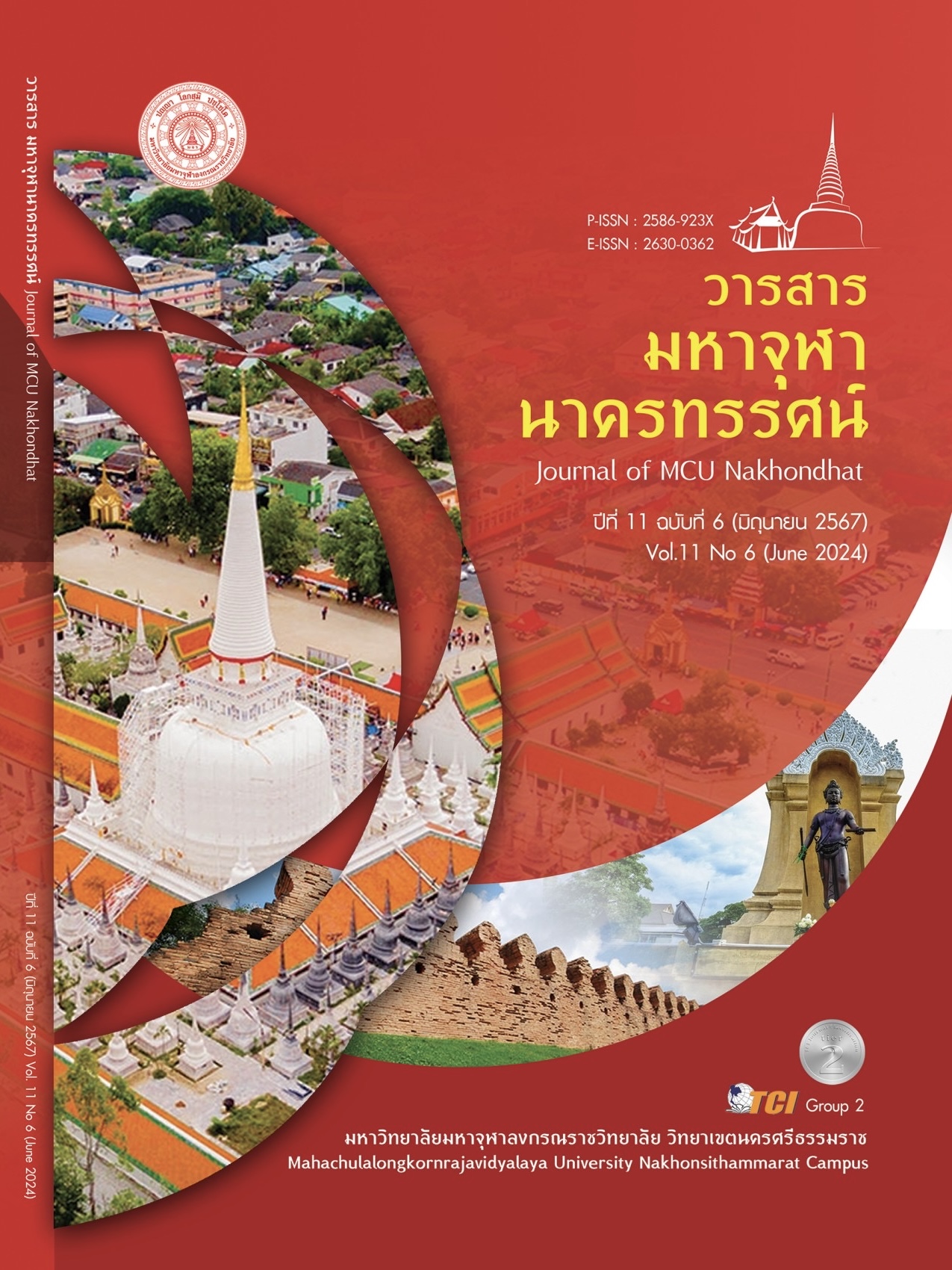THE APPLICATION OF SARANIYADHAMMA PRINCIPLES IN THE WORK OF VOLUNTEERS FOR SOCIAL DEVELOPMENT AND HUMAN SECURITY IN NAKHON SI THAMMARAT PROVINCE
Main Article Content
Abstract
The objectives of this research article are to study 1) The use of Saraniyadhamma principles in the work of social development and human security volunteers and 2) Guidelines for promoting the use of Saraniyadhamma principles in the work of social development and human security volunteers. Humans of Nakhon Si Thammarat Province It is a combined method research.
The sample group consisted of 385 people. The key informants were social development and security. of people in Nakhon Si Thammarat Province Volunteer Chairman of Social Development and Human Security Representatives of the Social Development and Human Security Volunteer Chairperson, 6 people, selected specifically. Research tools are questionnaires and in-depth interviews. Statistics used in research are frequency, percentage, mean, and standard deviation. and descriptive content analysis. The research results found that 1) The use of Saraniyadhamma principles in the work of volunteers for social development and human security. Overall it is at a high level ( = 4.20) considering each aspect. The aspect with the highest average is the principle of Metta Manokarma (
= 4.41), followed by the principle of Metta kayakarma (
= 4.37), the principle of Silasamaññata (
= 4.33), and the principle of Metta Vajikarma (
= 4.24). Principles of Ditthisamanyata (
= 4.18) and Principles of Public Health (
= 3.66), respectively. 2) Guidelines for promoting the use of Saraniyadhamma principles in the work of social development and human security volunteers in Nakhon Si Thammarat Province. Summarized as a body of knowledge, it is the MMW Model, which includes 1) M (Morality) precepts, which refers to the principles that should be followed when performing work, namely the principle of loving-kindness. Principles of Mettavajikarma and the principles of Silasamaññata, 2) M (Meditation), Samadhi, meaning the mind's control, determination, good desire, which is the principle of loving-kindness, and 3) W (Wisdom), wisdom, which means understanding, knowing oneself, knowing one's work, which is the principle of public health. and the principles of the common view
Article Details

This work is licensed under a Creative Commons Attribution-NonCommercial-NoDerivatives 4.0 International License.
References
กัลยกร ลาภเดโช และสุกิจ ชัยมุสิก. (2562). การประยุกต์ใช้หลักสาราณียธรรมในการปฏิบัติงานของบุคลเทศบาลนครแหลมฉบัง อำเภอศรีราชา จังหวัดชลบุรี. วารสารปริทรรศน์ วิทยาลัยสงฆ์นครสวรรค์, 7(2), 263-274.
คุณากร เกื้อด้วง. (2566). การอยู่ร่วมกันเพื่อสังคมสันติสุขโดยใช้หลักสาราณียธรรม 6 ในเขต อำเภอเมือง จังหวัดกระบี่. วารสารพุทธสังคมวิทยาปริทรรศน์, 8(1), 82-93.
พระพรหมคุณาภรณ์ (ป.อ.ปยุตฺโต). (2546). ธรรมนูญชีวิต. กรุงเทพมหานคร: โรงพิมพ์มหาจุฬาลงกรณราชวิทยาลัย ในพระบรมราชนูปถัมถ์.
พศิน สินมา และพระสุทธิสารเมธี. (2566). การประยุกต์ใช้หลักพุทธจริยศาสตร์ในงานสังคมสงเคราะห์. วารสารปรัชญาปริทรรศน์, 28(1), 1-12.
ยอดขวัญ มณีฉาย. (2565). การพัฒนาชุมชนเข้มแข็งโดยใช้หลักสาราณียธรรม ศึกษาเฉพาะกรณีบ้านไสกรูด ตำบลนาไม้ไผ่ อำเภอทุ่งสง จังหวัดนครศรีธรรมราช. ใน วิทยานิพนธ์พุทธศาสตรมหาบัณฑิต สาขาการพัฒนาสังคม. มหาวิทยาลัยมหาจุฬาลงกรณราชวิทยาลัย.
ระพีพรรณ คำหอม และรณรงค์ จันใด. (2561). หลักการและกระบวนการปฏิบัติงานสังคมสงเคราะห์จุลภาค. กรุงเทพมหานคร: มหาวิทยาลัยธรรมศาสตร์.
วีรศักดิ์ สุรเมธี. (2555). สาราณียธรรม 6. เรียกใช้เมื่อ 15 กรกฎาคม 2566 จาก https://www.gotoknow.org/posts/460447
สามารถ มังสัง. (2562). สาราณียธรรม 6: หลักการในการอยู่ร่วมกัน. เรียกใช้เมื่อ 15 กรกฎาคม 2566 จาก https://mgronline.com/daily/detail/9620000029668
สำนักงานพัฒนาสังคมและความมั่นคงของมนุษย์จังหวัดนครศรีธรรมราช. (2565). รายงานสถานการณ์ทางสังคมจังหวัดนครศรีธรรมราช ประจำปี 2565. นครศรีธรรมราช: สำนักงานพัฒนาสังคมและความ มั่นคงของมนุษย์.
Yamane, T. (1973). Statistics: An Introductory Analysis. (3rd ed.). New York: Harper and Row.


